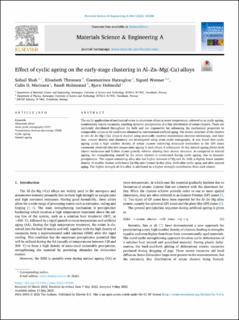| dc.contributor.author | Shah, Sohail | |
| dc.contributor.author | Thronsen, Elisabeth | |
| dc.contributor.author | Hatzoglou, Constantinos | |
| dc.contributor.author | Wenner, Sigurd | |
| dc.contributor.author | Marioara, Calin Daniel | |
| dc.contributor.author | Holmestad, Randi | |
| dc.contributor.author | Holmedal, Bjørn | |
| dc.date.accessioned | 2022-08-05T13:10:08Z | |
| dc.date.available | 2022-08-05T13:10:08Z | |
| dc.date.created | 2022-07-08T14:09:12Z | |
| dc.date.issued | 2022 | |
| dc.identifier.citation | Materials Science and Engineering: A, 2022, 846, 1-10. | en_US |
| dc.identifier.issn | 0921-5093 | |
| dc.identifier.uri | https://hdl.handle.net/11250/3010390 | |
| dc.description.abstract | The cyclic application of mechanical stress to aluminum alloys at room temperature, referred to as cyclic ageing, continuously injects vacancies, enabling dynamic precipitation of a fine distribution of solute clusters. These are uniformly distributed throughout the bulk and are responsible for enhancing the mechanical properties to comparable values as T6 conditions obtained by conventional artificial aging. The atomic structure of the clusters in two Al–Zn–Mg (-Cu) alloys is studied using atomically resolved transmission electron microscopy, and their size, volume density and chemistry are investigated using atom probe tomography. It was found that cyclic ageing yields a high number density of solute clusters exhibiting structural similarities to the GPI zones commonly observed after low temperature ageing in such alloys. A subsequent 10-day natural ageing allows both cluster nucleation and further cluster growth, without altering their atomic structure. As compared to natural ageing, the strengthening caused by the solute clusters is accelerated during cyclic ageing, due to dynamic precipitation. The copper containing alloy also had higher amounts of Mg and Zn. Still, a slightly lower number density of smaller clusters with lower Zn/Mg ratio formed in this alloy, both after cyclic aging and after natural aging. The higher strength of this alloy is attributed to a higher strength contribution from each cluster. | en_US |
| dc.language.iso | eng | en_US |
| dc.publisher | Elsevier | en_US |
| dc.rights | Navngivelse 4.0 Internasjonal | * |
| dc.rights.uri | http://creativecommons.org/licenses/by/4.0/deed.no | * |
| dc.subject | Natural ageing | en_US |
| dc.subject | Cyclic ageing | en_US |
| dc.subject | Transmission electron microscopy (TEM) | en_US |
| dc.subject | Atom probe tomography (APT) | en_US |
| dc.subject | Aluminum alloys | en_US |
| dc.title | Effect of cyclic ageing on the early-stage clustering in Al–Zn-Mg(-Cu) alloys | en_US |
| dc.title.alternative | Effect of cyclic ageing on the early-stage clustering in Al–Zn-Mg(-Cu) alloys | en_US |
| dc.type | Peer reviewed | en_US |
| dc.type | Journal article | en_US |
| dc.description.version | publishedVersion | en_US |
| dc.rights.holder | © 2022 The Authors. Published by Elsevier B.V | en_US |
| dc.source.pagenumber | 1-10 | en_US |
| dc.source.volume | 846 | en_US |
| dc.source.journal | Materials Science & Engineering: A | en_US |
| dc.identifier.doi | https://doi.org/10.1016/j.msea.2022.143280 | |
| dc.identifier.cristin | 2037718 | |
| dc.relation.project | Norges forskningsråd: 294933 | en_US |
| dc.relation.project | Norges forskningsråd: 197405 | en_US |
| dc.relation.project | Norges forskningsråd: 269842 | en_US |
| dc.source.articlenumber | 143280 | en_US |
| cristin.ispublished | true | |
| cristin.fulltext | original | |
| cristin.qualitycode | 2 | |

